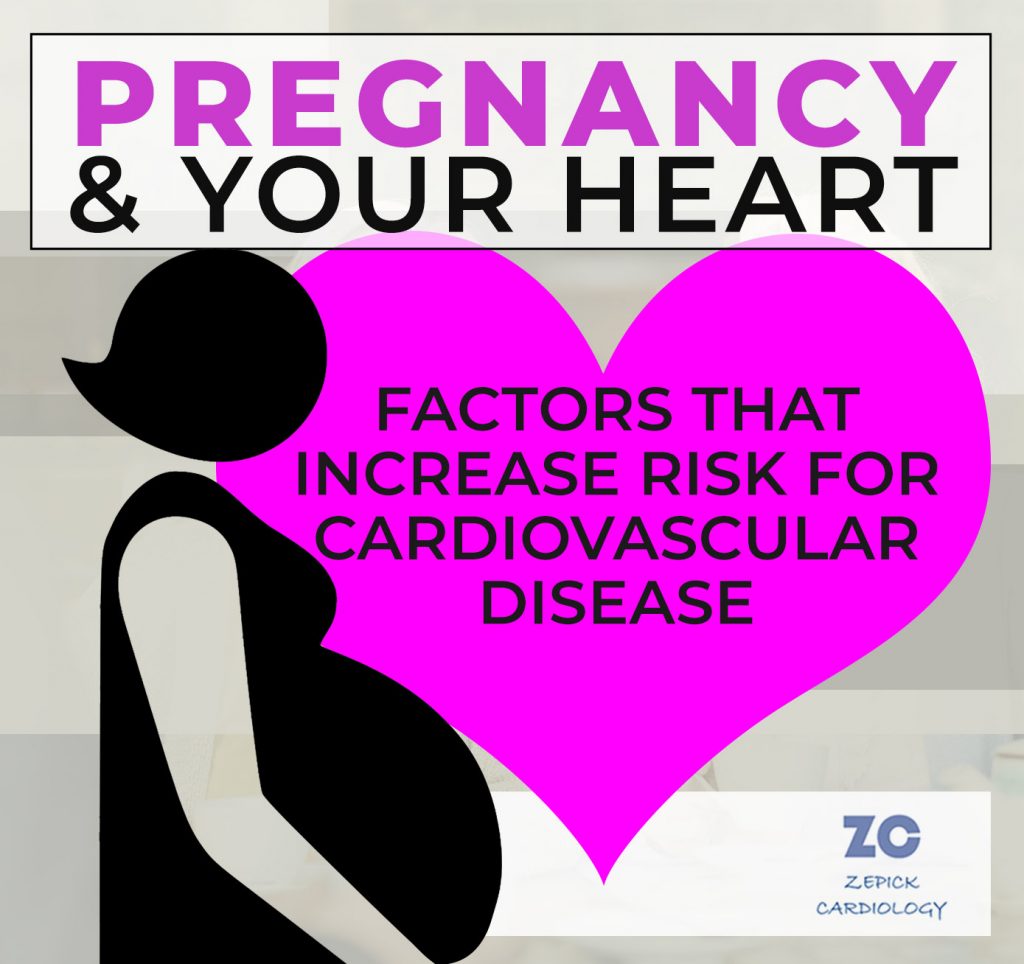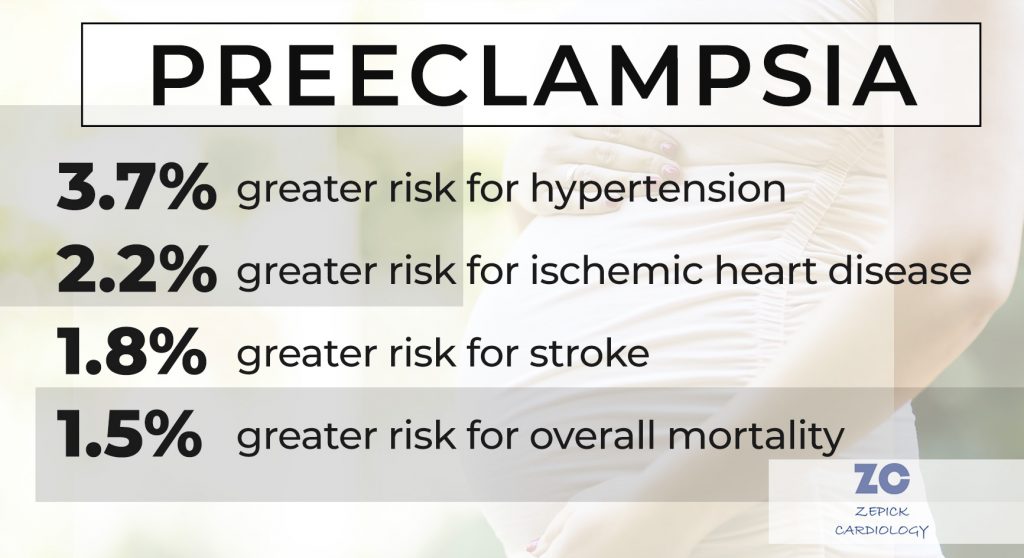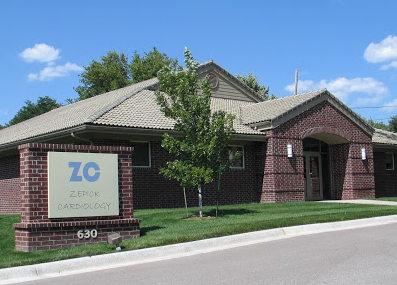Pregnancy & Increased Heart Disease Risk
Women’s Health: Unique Risks for Developing Cardiovascular Disease

Cardiovascular disease is the leading cause of death for women in the United States. It is an important health concern that women should be aware of. While heart disease does affects both men and women, there are many different factors that can put a woman at an increased risk.

Among the risk factors that are unique to women is pregnancy. A variety of complications and health issues have been found to make a woman’s chances of facing heart issues double, triple or even worse. Here at Zepick Cardiology, we treat people of all demographics dealing with their own unique issues relating to their heart health.
New medical studies over the past few years have placed a focus on health matters that specifically affect women. There are many issues that put women at increased risk for heart disease from menopause to hypertension. A variety of complications and health issues surrounding pregnancy and birth have been found to make a woman’s chances of facing heart issues double, triple or even more.
Pregnancy: Increased Cardiovascular Disease Risks
ADVERSE PREGNANCY OUTCOMES
About 10% to 20% of all pregnancies have what is referred to as adverse pregnancy outcomes. This includes such situations as preterm birth, stillbirth, and low birth weight. These adverse outcomes have been found to be associated with an increased risk for those women to develop cardiovascular disease in their future. If you had one of these pregnancies, you are more likely to develop heart disease.
PREECLAMPSIA

Preeclampsia is a relatively rare hypertension disorder. It happens typically after 20 weeks into pregnancy and causes the woman to have dangerously high blood pressure. It can lead to serious, even fatal, problems such as seizures. Usually the condition goes away with, or shortly after, childbirth.
The most serious risks usually end when the condition ends with childbirth. But research shows that women who have experienced preeclampsia during pregnancy also face an increased risk of developing heart disease. Studies show that after 10-15 years after having preeclampsia, these women are face the following increase risks:
- 3.7 times greater risk for hypertension (high blood pressure)
- 2.2 times greater risk for ischemic heart disease (heart not receiving enough blood)
- 1.8 times greater risk for stroke
- 1.5 times greater risk for overall mortality
There are other hypertension disorders a woman can experience during pregnancy. Women who are diagnosed with any hypertensive disorder of pregnancy are at an increased risk for chronic hypertension, even as soon as within the first year after pregnancy. They also have double the risk of being hospitalized for a cardiovascular issue within 3 years of delivery.
Having a hypertension disorder during a pregnancy also increases the risk for coronary disease and for having heart failure and valvular heart disease.
GESTATIONAL DIABETES
Women who develop diabetes during their pregnancy find themselves at risk for further conditions. Not only are they at higher risk of developing type 2 diabetes later in life, they also face increased risks for heart disease. Women who have gestational diabetes have:
- double the risk of developing hypertension
- double the risk for having a stroke
- nearly three times more likely for having ischemic heart disease.
PREMATURE BIRTH
Giving birth several weeks early increase a woman’s risk for heart issues. Giving birth to a child before 37 weeks into the pregnancy doubles the mother’s risk for cardiovascular disease. It also doubles the risk for dying from coronary heart disease. When the birth happens prior to 34 weeks along, that risk is even high.
PREGNANCY LOSS
Women who have had a miscarriage or a stillbirth face greater cardiovascular disease risk. They have double the risk for having a heart attack (technically called myocardial infarction), a stroke (cerebral infarction), or renovascular hypertension.
Having had a miscarriage also puts you at 1.5 times increased risk of developing some form of cardiovascular disease. Multiple miscarriages increase that risk to 2 times.

Why it’s Important to Know Your Risks
If you faced one or more of these situations during a pregnancy, it can be disheartening to find out that it has put you at greater risk for developing cardiovascular disease. But there is some good news. With new research and knowledge into what puts women uniquely at risk for heart disease, doctors and cardiologists can be more able to react to the care you need. For example, the American College of Obstetrics and Gynecology now recommends that women who have an adverse pregnancy outcome undergo a cardiovascular risk screening withing 3 months after that pregnancy.
Getting correctly diagnosed with heart disease can mean the important treatment you need can begin sooner. In addition, when a physician identifies that a patient is at greater risk for developing cardiovascular issues, they can provide the proper recommendations to help protect the patient’s heart health. Increasing certain activities and making lifestyle changes can go far in helping a person avoid or delay developing dangerous conditions.
For some time in our medical history, women were being underdiagnosed with cardiovascular disease and/or not getting the sufficient treatment or care for it. Knowing how women are uniquely affected by heart disease or the factors that put them at greater risk creates great opportunity to help women better deal with or even prevent suffering with cardiovascular disease.
Questions About Your Heart Treatment?
When you get care at Zepick Cardiology in Wichita, we take the time to talk through your health and your risk factors. Whether you are a man or a woman, we will make sure to address your specific situation and as well as go over the best treatment and care for you.
If you have any questions or concerns regarding your heart health, feel free to call us at Zepick Cardiology at (316) 616-2020.







